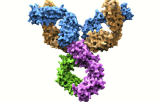
Cross-adsorbed secondary antibodies
Cross-adsorbed secondary antibodies are polyclonal antibodies that have undergone an additional purification step called cross-adsorption to filter out members that bind to off-target species of immunoglobulins (IgG) .
Cross-adsorption is a process that involves isolating the antibodies from antiserum by binding to target proteins that have been immobilized on solid-phase gels. The gels used for cross-adsorption may contain proteins from different species, different mouse IgG subclasses, or different antibody fragments. Cross-adsorbed secondary antibodies exhibit minimal cross-reactivity with those species, whether presented by the experimental antibodies or by endogenous proteins in the sample. Pre-adsorption, which is another term for cross-adsorption, is an extra purification step introduced to increase the specificity of a secondary antibody.
Cross-adsorbed secondary antibodies are recommended for avoiding detection of immunoglobulins that are not the intended target in many immunotechniques that require antibodies from multiple species in the assay system, such as ELISA, flow cytometry, or IHC. Efficient cross-adsorption may be achieved by using a high concentration of immobilized antigen and a long incubation time.






